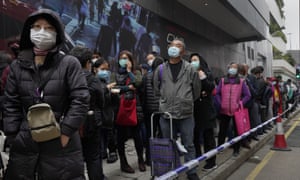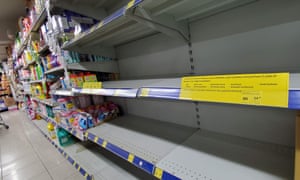'It's like a war': the fight for rice and toilet roll as coronavirus convulses Hong Kong
Widespread anxiety that epidemic could last many months and basic necessities will run out is gripping the city

It is reminiscent of the Soviet Union in the 1980s. Queues form at the crack of dawn every morning in front of supermarkets across Hong Kong, with people scrambling to lay their hands on the basics: rice, toilet rolls and disinfectant.
For the third week in a row, supermarkets shelves that usually heave with bags of rice – a staple food for Hong Kongers – are empty, and packs of noodles are running out too, although there is still plenty of meat and vegetables.
Shelves for toilet paper, tissues, kitchen towels, baby wipes, hand soaps, alcohol hand rubs and cleaning agents such as bleach, floor cleaning liquid and all manners of disinfectants and antiseptic products in supermarkets and pharmacies are also bare. Supermarkets have started implementing a rationing policy limiting customers to two items of the products in short supply.
Although Hong Kong has only 50 confirmed cases of coronavirus and one fatality, there is widespread anxiety that the epidemic could last many months and basic necessities will run out. A deepened sense of crisis once again grips the community, which has been blighted by months of anti-government protests in which over 7,000 people have been arrested.
On Wednesday morning, dozens waited outside a supermarket on Bonham Road in the Mid-Levels, a gentile, upper-middle-class neighbourhood, with many wrapped in headscarves and thick jackets and medical masks.
“We have no idea how long this will drag on for and the more I hear about the more panicky I get,” said Mrs Chung, who did not wish to give her full name and who had been waiting since 7am, an hour before the supermarket opened. “Even the medical professionals are running out of gear – how can you not get worried?”

Despite officials and traders’ reassurance of food supply, the 65-year-old was not convinced. The Rice Merchants’ Association of Hong Kong, said last week the supply of rice was regulated by the government and there were still 13,000 tonnes in storage.
“I don’t believe a word the government says. My view of our future is very grim,” said Chung, before she hurried into the supermarket with dozens of shoppers.
Quick guide
What is the coronavirus and should we be worried?
Panic has set in across Hong Kong over the coronavirus outbreak, which has killed more than 1,115 and infected over 45,000 across the world, mostly in China. A number of private clinics have closed temporarily after they ran out of masks. Hospital staff say they are running out of masks and protective clothing, prompting a strike last week that demanded the government close all its borders with China and provide adequate protective gear.
Thousands of people camped overnight early last week, braving chilly winds outside an outlet that had procured a supply of masks from the Middle East. Long queues quickly form in front of any shops where a fresh stock of necessities in short supply have arrived. People join if there is a queue just to grab what they can get hold on.
On Bonham Road on Wednesday morning, the few remaining items of rice and paper products were quickly snapped up, leaving most customers disappointed. A staff member said: “It’s like there’s a war on – things fly off the shelves as soon as we restock.”
“How about flour? You can make pancakes then,” said an elderly lady with a smile.
Joseph Cheng, a retired political scientist at the City University of Hong Kong, said the panic buying stemmed from a deep level of distrust in the government, which is seen as incompetent in handling the crisis. What started as a public health crisis has turned into yet another political crisis.
“It is a governing crisis – they cannot even secure the supply of masks, people cannot be reassured. The epidemic could have been an opportunity to restore confidence in the government,” Cheng said, adding that Hong Kong’s Asian neighbours such as Singapore, Taiwan and Macau have all implemented measures to help citizens to secure the supply of masks.
A poll carried out by the Hong Kong Public Opinion Research Institute last month showed the level of distrust in the government has plunged to 69.2%, an all-time low since the poll began in 1992.
Johnny Lau, a political commentator on Chinese politics, said the lack of trust in the Hong Kong government has extended to Beijing and as Carrie Lam, the region’s chief executive, is deeply unpopular but supported by Beijing “people will be sceptical towards Beijing’s policy towards Hong Kong”.
“This shows that Hong Kong’s political future is only heading for self-destruction,” he said.
No comments:
Post a Comment